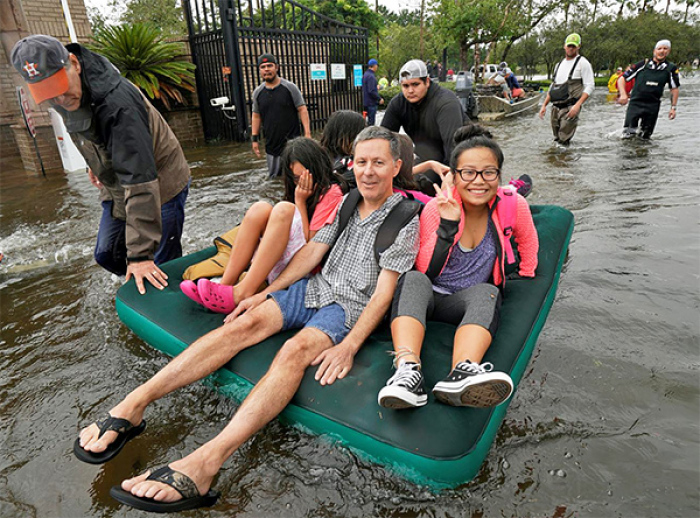Hurricanes, Wildfires, Mass Shooting: : 6 Ways to Comfort Your Kids During This Tragic Month

Communities all across the nation are reeling from incredible catastrophe. Hurricanes have ravaged Caribbean islands on the Atlantic and Gulf coasts, wildfires rampage in the west, and the absolute evil of a mass shooting in Las Vegas has left us all wondering how much more we can take.
It is hard enough to process these events and the nonstop news coverage as adults. But what about our kids? They are hearing about our nation's events at school, in the lunchroom, at the bus stop and on the soccer field. There is a misconception among some adults that if we do not talk about it — or ignore it — it will protect our children.
Not so.
What about the children who lost a loved one, had their home destroyed, overheard adult conversations or a newscast about violence or are watching their parents process and grieve everyday trauma?
Trauma is best understood as any event that shatters our sense of safety. Immediately, one can become hyper vigilant — overly sensitive and set on emotional alert. Fear rules, especially in kids. In these moments, children need adults who are attuned to their emotions and tender to their needs.
Below are six ways you can comfort and support your kids in the wake of these tragedies.
1. Togetherness. This is a time where your kids need to have you close. They need to know they're safe. Pull in together as a family. Pray together. Be together. The antidote to trauma is safe, loving relationships. Coddle your children a little bit more. Stay in close proximity to them, particularly if they're anxious or afraid.
2. Touch and Tenderness. Touch is an expression of affection that reinforces proximity and closeness. It calms. Fear makes our minds race and wander, but tender touch dispels fear. Hold a hand. Stroke your children's hair. Let them sit in your lap. Wrap your arms around them. Kiss them. Be present emotionally. If they're acting out a little bit with anger, rebellion or defiance, it very well could be a fear response. Be sensitive to their behavior.
3. Talk. The questions will come: "Why did that man hurt all those people?" "Where will we live if our house burns down?" Be present, sensitive and don't offer pat answers. Engage them in age-appropriate discussion and reassure them they're not alone — adults are around to help and protect them. Contrary to what many of us believe, talk doesn't perpetuate anxiety — it helps reduce it. Avoid graphic details, but don't skirt around the issue. Become a safe place for them to bring their questions.
4. Truth. Fears of the unknown can paralyze us. Anchor their hearts in truths like, "Not everyone in the world is bad," "You're safe now" and "God loves us and is close to us." Remember, our kids absorb us. Your mood, thoughts and actions directly influence theirs. Parents, these truths flow through you. Share the promises of God's Word with your kids. Pray for them and with them.
5. Triggers. Someone screaming. A door slamming. A siren. What children experience or see on the news can deeply affect them. Don't let your kids get overdosed with the news stories and all the gory details. This can lead to nightmares, excessive bouts of crying, deepening fear and not wanting to attend school. Be attuned to your children. Don't react to their emotions, respond lovingly.
6. Time. Don't rush or ignore this process. We are all being bombarded with information about these sad events. Keep your life as normal as possible. Sameness and routine reinforce the message of safety for your kids. Your family stability over time will help dispel their fears.
Our children are not immune to the darkness and brokenness of our world. We may think that if we ignore this incident, our kids won't know about it or feel the impact. Nothing could be further from the truth! Our kids need parents and teachers — those who have influence in their lives — to be emotionally present and invested, especially in moments like these.




























